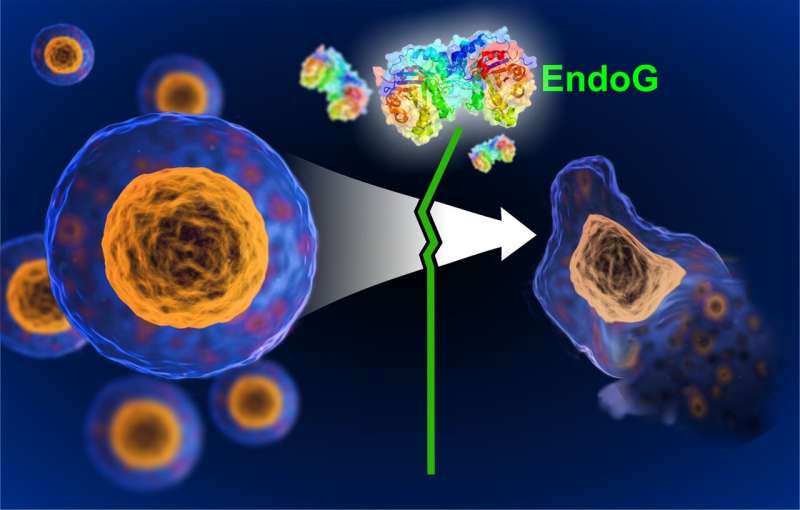Biochemists discover an enzyme to stop cell death

RUDN biochemists found out that apoptosis (programmed cell death) can be regulated using the EndoG enzyme. The discovery will lead to a better understanding of cell and tissue protection mechanisms. The results of the study were published in the Biochimie journal.
Defective (e.g.infected or mechanically damaged) cells are destroyed by apoptosis—regulated cell death. Due to this, the cells are constantly updated. Up to 70 billion cells are destroyed by apoptosis in a healthy human body every day. If the process changes (speeds up or slows down), it leads to oncological, autoimmune, neurodegenerative, and other disorders.
There are several enzymes called apoptotic endonucleases that participate in programmed cell death. RUDN biochemists demonstrated that one of them named EndoG can stop the cell death process if it goes out of control. It turned out that increased EndoG secretion reduces the volumes of another endonuclease called DNase I and slows down the process of apoptosis in its early stage. Previously the two enzymes were supposed to work together, i.e. to mutually affect the DNA of a defective cell to destroy it. RUDN biochemists were the first to demonstrate that EndoG and DNase I were, in fact, more competitors than comrades.
"The EndoG enzyme acts as a protective mechanism against DNase I and DNA destruction. In this case the mechanism of cell death turns out to be very interesting: EndoG, the enzyme that destroys DNA, is able to stop apoptosis if it goes too far or too fast," said Dmitry Zhdanov, a co-author of the work, a Candidate of Biology, and an Assistant Professor of the Berezov Department of Biochemistry at RUDN.
To carry out the experimental research, RUDN biochemists used the blood of 50 people from 18 to 25 years of age without any diagnosed diseases. The scientists induced the increase of EndoG synthesis in T-lymphocytes of the donors. Then using a DNA-destroying substance called bleomycin the scientists initiated the process of apoptosis in the cells and measured the levels of EndoG and DNAse I. It turned out that the excess of EndoG reduced the level of DNAse I and therefore slowed down the whole process of apoptosis.
"We were the first to demonstrate the negative correlation between EndoG and DNAse I. This discovery may help fine-tune the response of a cell to any damage, and the activation of EndoG may become a protective mechanism against uncontrolled cell death," added Zhdanov.
The participants of the study also represented Orekhovich Science and Training Institute for Biomedical Chemistry and Blokhin National Medical Research Center of Oncology.
More information: Dmitry D. Zhdanov et al. Endonuclease G modulates the alternative splicing of deoxyribonuclease 1 mRNA in human CD4+ T lymphocytes and prevents the progression of apoptosis, Biochimie (2018). DOI: 10.1016/j.biochi.2018.11.020
Provided by RUDN University




















